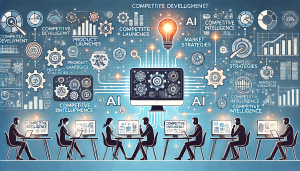 UseCasesFor.ai
UseCasesFor.ai
Choose Topic
 UseCasesFor.ai
UseCasesFor.ai
AI Use Cases
A collection of over 250 uses for artificial intelligence
A continually updated list exploring how different types of AI are used across various industries and AI disciplines,including generative AI use cases, banking AI use cases, AI use cases in healthcare, AI use cases in government, AI use cases in insurance, and more

Sign up
to receive a PDF containing all the use cases and stay updated with the latest AI trends and news (you can always unsubscribe)
Competitive analysis

Introduction
The market of product development is growing and becoming very much competitive as well. In the current world where products are becoming more complex and technology is advancing at a very fast rate, organizations are in a constant search for ways to outperform their rivals. One of such is the application of Generative Artificial Intelligence (Gen AI) in competitive analysis in the product development process. Gen AI is a type of AI that has cognitive intelligence that enables it to mimic the human intelligence in understanding, learning, predicting, and functioning on its own in any domain of knowledge. As far as product development is concerned, it can help in analyzing the changes in the market as well as the consumers, competitors’ plans, and other relevant factors that influence the success of a product.
Challenges
There are, however, some potential drawbacks and challenges that come with the use of Gen AI in competitive analysis when applied to the product development process. First, the massive volume of data and its complexity can be a problem. Second, there is a problem of data privacy and security. Companies have to guarantee that the data they are gathering and processing is valid and relevant and, at the same time, protected from illegal activities such as hacking. Third, implementation of AI into current structures may be procedural and can be rather complex and may need a lot of resources. Finally, there is the issue of interpretation – the information produced by AI has to be effectively analyzed and translated into management guidelines, which only an individual with proper knowledge of business and industry can do.
AI Solutions
Despite all of these challenges, there are situations where AI can offer valuable solutions. First of all, AI algorithms are capable of working with large sets of data, which makes them able to recognize similarities and differences that would be simply unfeasible for a human being to identify. Second, AI can also assist in the protection of data privacy and security through the use of encryption and detection of anomalies. Third, AI can be implemented into current systems through application programming interfaces which makes the adoption of the technology simple. Last but not the least, the application of AI can also assist in creating better competitive analysis thus providing better strategies. For example, North Face has engaged IBM’s Watson AI to help in identifying the competitor’s pricing and product offering.
Benefits
There are a number of ways in which using Gen AI in competitive analysis can be beneficial for the product development industry. First, it can provide better and more timely information that can enable organisations to outperform their rivals. Second, it can also assist in the integration and coordination of the process and may reduce the need for human intervention. Third, it can also help in cutting down on costs as AI is known to work more effectively as compared to humans. Last but not the least, it can result in creation of creative products since AI can pinpoint holes in the market and come up with new product concepts.
Return on Investment
It is possible to achieve a decent ROI when applying Gen AI in competitive analysis as well. A study by McKinsey & Company has revealed that organizations that adopt AI in product creation can enhance the revenue by 20% while reducing the expenses by 30%. In addition, it has been established that the application of AI can result in gain of market share since the companies are in a position to understand the shifts in the market and the customer’s needs. For example, Amazon has become one of the leading players in the e-commerce sector thanks to the application of artificial intelligence in the development of new products.